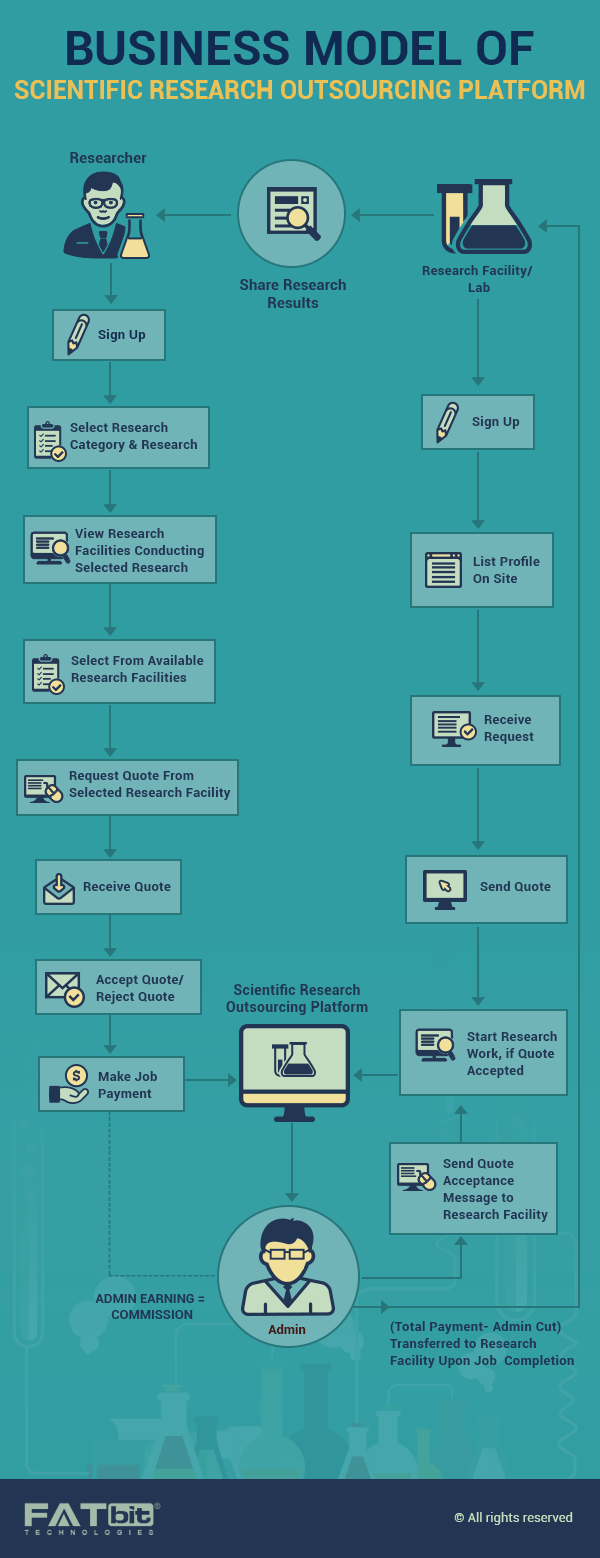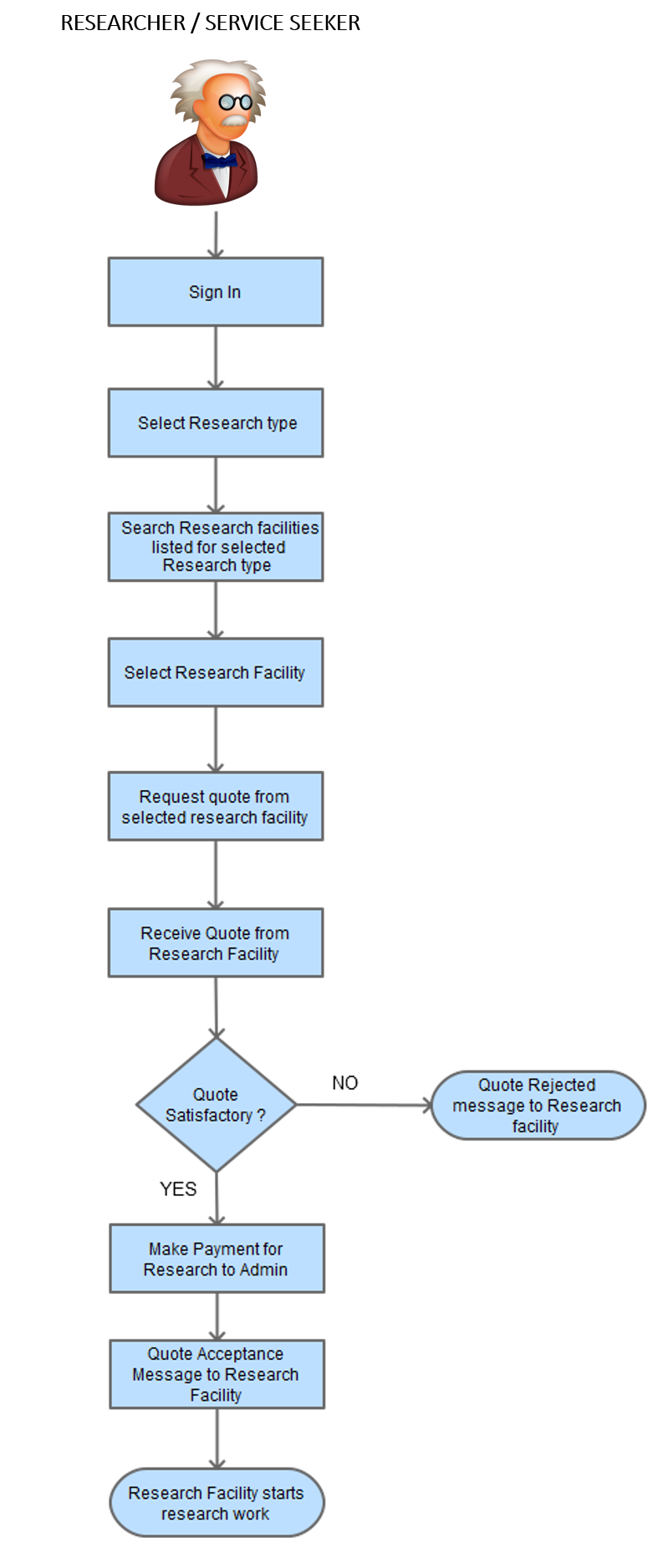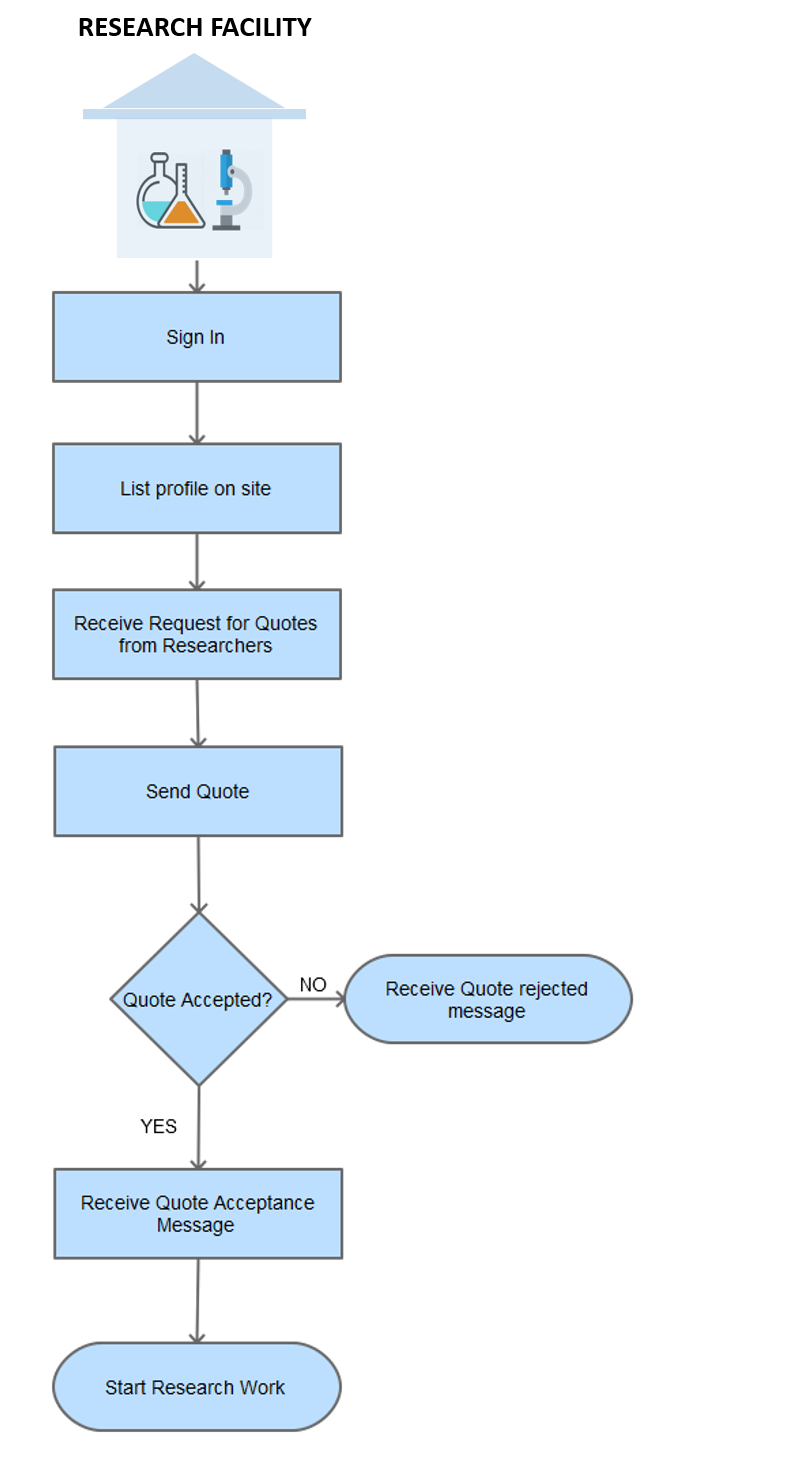Scientific research outsourcing platforms like Science Exchange & Assay Depot are revolutionizing the way scientists carry out the research work. Over the past few years, these platforms have been under constant praise for making scientific research work quicker and efficient.

Not only these research work outsourcing platforms are helping the scientific community but also making quite a progress as a business. Their success triggered FATbit analysts to do an in-depth study of this unique and potential marketplace and gather essential insights that may help aspiring entrepreneurs looking for a potential ecommerce idea.
Business & Revenue Model
Like most emerging ecommerce marketplaces these days, platforms like Science Exchange & Assay Depot also provide an online platform that connects people in need of services to service providers in search of consumers. Here, the two groups are ‘researchers looking for facilities’ and ‘facilities awaiting researchers’.
Here is how things work on these research work outsourcing websites:
- Researchers browse through lab facilities listed on the website
- After choosing the most suitable one, they request a quote from the lab
- Once order is confirmed and results are delivered, researchers pay lab through the website from which the website cuts its share
You may decide how much commission you want to cut on your website.
On the other end, the site should offer a second module for labs to list their services with price, availability and timeframe for a particular job.

Innovations Accelerated
As per the market research, by using these websites researchers can get experiments done in up to half the price charged at their home university’s core facilities, and that without waiting for lab assistant’s updates. Certainly, these research outsourcing platforms provide a much convenient, organized, quick and affordable way to carry out research work.
With portals like Science Exchange & Assay Depot, now scientists of India, China and other developing countries can leverage the same research facilities as their counterparts in developed countries. This in turn will certainly accelerate the pace of innovation across the globe.
Now that we have uncovered the potential of this marketplace, let’s unravel how this business model should be executed with the best feature and their right implementation.
Science Exchange Website Features
Your website should be easy to navigate through and highly intuitive since the user experience is a key factor that can help you have the edge over the existing players. In simple words, there should be absolutely no ambiguity throughout the site, whether it is site design, components or content. Now let’s see how the homepage should be designed:
Homepage Highlights
First and foremost thing to ensure is that homepage should feature every service that site has to offer. As visitors land on the site, they should be greeted with a clear website message that explain what your platform is about, preferably, with a search tool in the banner section.
Below the fold area can be used to describe your business, how it makes research process quick & easy, and various offerings with effective use of graphics. You can also include a section that features testimonials by researchers on using your platform. This will make your website more engaging.
Other than these, the footer area can act as a navigation panel for content based pages & other offered services.
Home page is your best bet to engage visitors
Make it right!
Research Facility Search
Apart from a custom search tool box, a comprehensive browse feature makes good sense for such portals. There should be a dedicated page that already lists the top lab results, which users can browse by using filters. Below is a list of features that you should consider for this section:
- Highlight most asked services to save researchers some time and efforts
- A few featured labs in image slider to give visitors an idea about the quality and sophistication of the facilities listed with your site
- Facilities should be divided into two categories: Experimental Services and Analytical Services. This helps users narrow down their search from the beginning
Outsourcing a Project
To fix a deal with labs listed on your website, a researcher must be logged in. Users can narrow down their search by selecting the appropriate category listed on the browsing page. On the process result page, users should be getting following options:
- See facilities results with their average pricing, and number of labs providing them
- Filter results further by selecting the appropriate experiment sub-category
- Sort results based on popularity, availability, and name
As users select a process, they should get results for the labs providing that particular service. And the lab result page should provide users following options:
- Filter results by country/city
- Review results based on lab info, ratings, completed projects, and pricing
- Check lab’s profile, request a quote, or ask them a question
Storefront: Lab Profile
The lab profile page should let researchers check everything there is to know about a core facility. The page should feature:
- Basic lab info and its location
- Services offered with pricing
- Reviews & endorsements
- Ratings & number of completed projects through the website
- Lab members
Ask a Question
Researchers should also be provided an option to start a discussion with a lab to ensure whether the facility will be able to provide exactly what they need. As users ask a question, a discussion thread would be created where researcher and lab representative can communicate on the website. Options that you should provide with this feature include:
- Upload important files
- Check project’s status, whether it is in the discussion, progress or completed
- Cancel the request
Request Quote
Once users are sure that the lab has the facility they are looking for, they can request a quote by outlining the requirements and sending relevant files.
Once labs review the requirements, they would send researchers a quote to begin the process. Labs and researchers can communicate over the phone, email or on website. Once the project is completed, researchers can write a review for the lab.

Listing a Lab
This section allows core facilities of universities and other private research labs to register themselves on the website. On the landing page, you should feature various benefits labs will get by getting listed on the website. Also, make sure you include an effective call-to-action on the page.
Other than these, the page should also feature feedback from the staff of labs already listed with your website to engage visitors further.
This page should be followed by a registration form that asks researchers following details:
- Contact details
- University/Company name
- Core facility name & type
- Services offered
- Description to high special services
After submitting this form, lab representative/admins should be displayed a message that tells them that their lab will be listed after the completion of the verification process.
All applications should be thoroughly examined by your team and a lab be listed on the site only after the team has verified its physical location and ensured the quality of its services.
See the process flow diagram shown below to understand how it works for a research lab:

User Profile and Dashboard
The sign up process should be simple and allow researchers to register through email or LinkedIn profile. The profile page should feature following:
- User’s information such as employment, education, publications, ratings, and also projects outsourced through the website
- Dashboard should feature users’ order history and notifications/messages from labs
Help Center
Your scientific research outsourcing platform should also manage an extensive Help Center, which should have dedicated sections for visitors, researchers, and laboratories.
Blog
Being in scientific research services, you should offer a very informative and versatile blog. It should cover topics like website features, new scientific paradigms, and everything in between. Consequently, the blog will have several categories. Users should also be able to search for a blog with a keyword.
Validation
Science Exchange’s CFO Elizabeth Iorns said in an interview that, “One of the most important principles of the scientific method is reproducibility, the ability to replicate an experimental result.” Therefore, like Science Exchange & Assay Depot, you should also launch a program that allows independent replication of scientific results to accelerate the innovations further.
Final Remarks
Undeniably, websites like Science Exchange & Assay Depot have accelerated the innovation rate with efficient usage of research facilities. However, though global, reach of these research work outsourcing platforms in many countries is quite weak. This means, there is much scope for similar portals targeting only a particular region only.
Such portals can do wonders in India and other developing countries where innovations are limited because researchers don’t have access to right research facilities. If you too are planning to build a similar site then, FATbit team would love to add value to its script with its design, development and marketing expertise.
How much time and money a Science Exchange clone will take?
Contact Us




